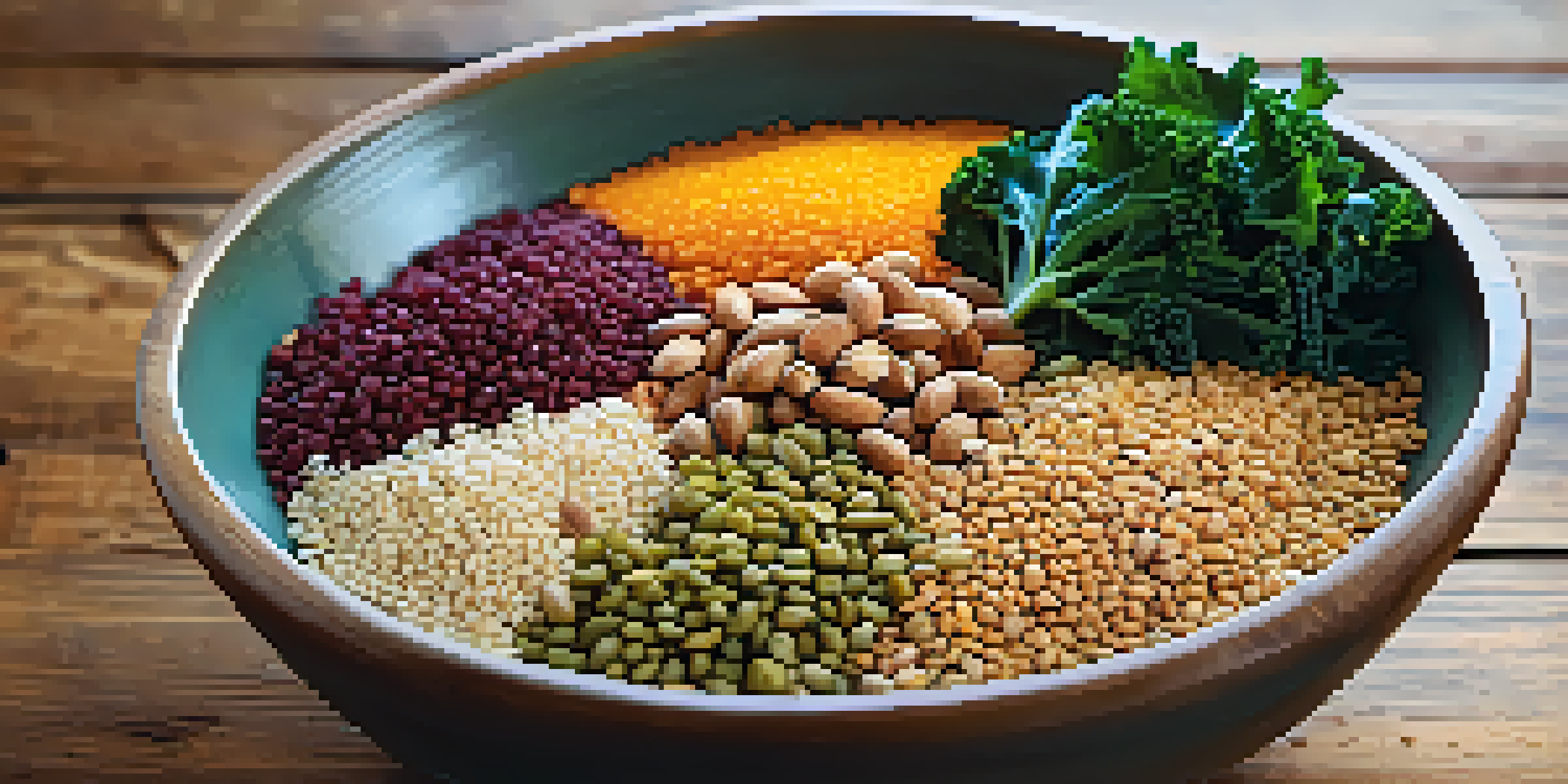The Role of Plant-Based Protein in Weight Management

Understanding Plant-Based Proteins and Their Sources
Plant-based proteins come from a variety of sources, including legumes, grains, nuts, and seeds. These proteins are not only rich in essential nutrients but also often lower in calories compared to animal-based proteins. Common examples include beans, lentils, quinoa, and chickpeas, which can easily be incorporated into meals.
Let food be thy medicine, and medicine be thy food.
One of the key benefits of plant-based protein is its high fiber content, which helps keep you feeling fuller for longer. This can be particularly beneficial for those looking to manage their weight, as it may reduce the temptation to snack on unhealthy options. Plus, fiber supports digestive health, making it a win-win for your overall well-being.
Moreover, incorporating more plant-based proteins into your diet can lead to a diverse range of meals. Exploring different cuisines can introduce exciting flavors and textures, transforming your meals into delicious experiences. This diversity encourages you to stick with healthier eating habits in the long run.
How Plant-Based Proteins Support Weight Loss
Plant-based proteins can play a vital role in weight loss by promoting a calorie deficit while still providing essential nutrients. When you consume fewer calories but maintain a nutrient-rich diet, your body can more effectively burn fat. Incorporating these proteins into meals can help you achieve that balance.

Research has shown that diets high in plant-based proteins are often associated with lower body weight and reduced body fat. This is largely due to the satiating effect of protein and fiber, which can help control hunger and reduce overall calorie intake. It’s a simple equation: the more satisfied you feel, the less likely you are to overeat.
Plant Proteins Aid Weight Management
Incorporating plant-based proteins can help create a calorie deficit while providing essential nutrients, aiding in effective weight loss.
Additionally, many plant-based proteins have a lower fat content than their animal counterparts, which can be beneficial for those watching their fat intake. Choosing beans over bacon or quinoa over cream can make a significant difference in your daily caloric consumption, aiding in your weight loss journey.
The Importance of Balanced Nutrition
While focusing on plant-based proteins, it’s crucial to maintain a balanced diet that includes a variety of food groups. This means complementing your protein sources with plenty of fruits, vegetables, and whole grains. A well-rounded diet ensures you receive all the vitamins and minerals your body needs to function optimally.
The food you eat can either be the safest and most powerful form of medicine or the slowest form of poison.
A common misconception is that plant-based diets lack essential amino acids, but this is easily rectified by consuming a mix of different protein sources. For example, combining rice and beans provides a complete protein profile, ensuring your body gets everything it needs. This balance is key not just for weight management but also for overall health.
Moreover, focusing solely on protein can lead to neglecting other important nutrients. By embracing a holistic approach to nutrition, you can enjoy a variety of flavors and textures while still supporting your weight management goals. It's all about finding the right balance that works for you.
Plant-Based Proteins and Metabolism Boost
Incorporating plant-based proteins into your diet can actually give your metabolism a boost. Proteins require more energy for digestion compared to fats and carbohydrates, meaning your body burns more calories processing them. This phenomenon, known as the thermic effect of food, can help support your weight management efforts.
Additionally, many plant proteins come packed with nutrients that can further enhance metabolic function. For instance, legumes are rich in magnesium, which plays a role in energy production. By consuming a diet rich in such nutrients, you can help your body operate more efficiently.
Balanced Diet Is Essential
Maintaining a balanced diet with diverse food groups ensures you receive all necessary vitamins and minerals for optimal health.
It's also worth noting that regular physical activity combined with a protein-rich diet can amplify these metabolic benefits. The combination of strength training and plant-based proteins can lead to increased muscle mass, which in turn can elevate your resting metabolic rate. This means you'll be burning more calories even when you're not exercising.
Common Myths About Plant-Based Proteins
Despite the growing popularity of plant-based diets, several myths persist about their effectiveness for weight management. One common belief is that plant proteins are inferior to animal proteins in terms of quality. However, many plant-based sources provide ample protein and essential amino acids when consumed in variety.
Another myth suggests that plant-based diets are not filling or satisfying. In reality, the high fiber content in plant proteins can promote satiety, helping you feel full longer. This can reduce the urge to snack unnecessarily, which is a crucial aspect of managing weight.
Lastly, some people worry that plant-based diets are too restrictive or complicated to maintain. With the vast array of foods available today, it's easier than ever to find delicious plant-based options that fit your lifestyle. From smoothies to hearty stews, the possibilities are endless, making it simple to enjoy nutritious meals.
Practical Tips for Incorporating Plant-Based Proteins
If you're looking to add more plant-based proteins to your diet, start by integrating them into familiar meals. For instance, substitute meat in your favorite chili with lentils or chickpeas for a hearty, protein-rich dish. Small changes like these can make a significant impact without overwhelming you.
Another effective method is to prepare batches of plant-based proteins ahead of time. Cook a large pot of quinoa or a big batch of beans so you have ready-to-use protein sources throughout the week. This not only saves time but also encourages you to incorporate these proteins into various meals easily.
Long-Term Health Benefits
A diet rich in plant-based proteins is linked to lower risks of chronic diseases and promotes overall well-being.
Lastly, don't shy away from exploring new recipes and cuisines. Experimenting with dishes from around the world can introduce you to exciting flavors and ways to enjoy plant-based proteins. With countless resources online, finding inspiration for your next meal is just a click away.
The Long-Term Benefits of Plant-Based Proteins
Adopting a diet rich in plant-based proteins can lead to long-term health benefits beyond weight management. Studies indicate that such diets are associated with lower risks of chronic diseases, including heart disease, diabetes, and certain cancers. This holistic approach to nutrition can pave the way for a healthier future.
Moreover, focusing on plant-based proteins encourages a diet rich in antioxidants and other beneficial compounds. These nutrients can help reduce inflammation and improve overall well-being, further supporting your weight management goals. It's not just about losing weight; it's about feeling good inside and out.

Lastly, embracing plant-based proteins can also have positive environmental impacts. Plant-based diets generally require fewer resources and produce less greenhouse gas emissions than animal-based diets. By making mindful choices about your food, you can contribute to a more sustainable planet while taking care of your health.